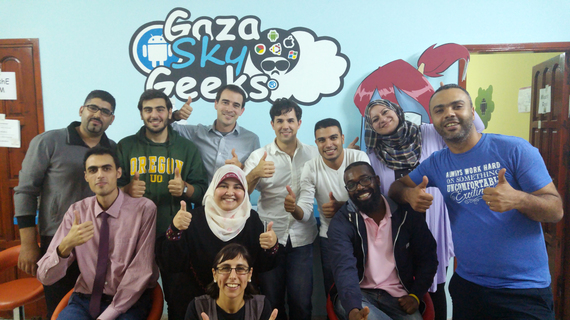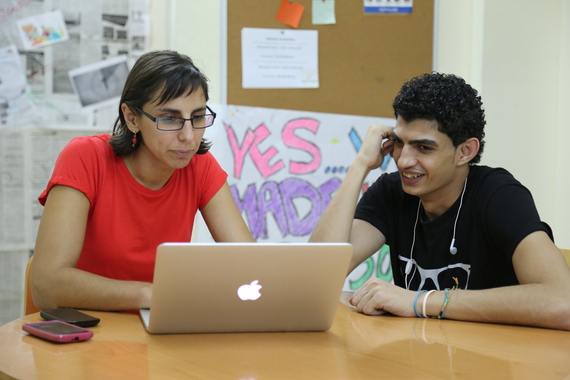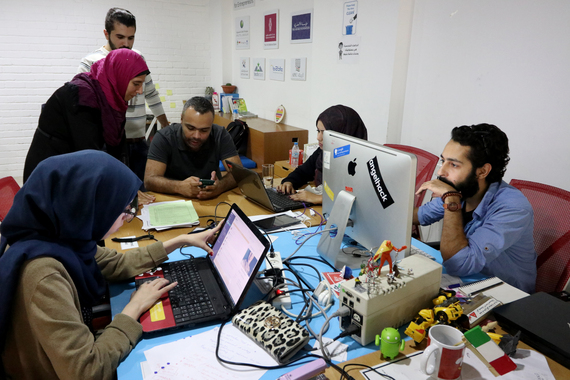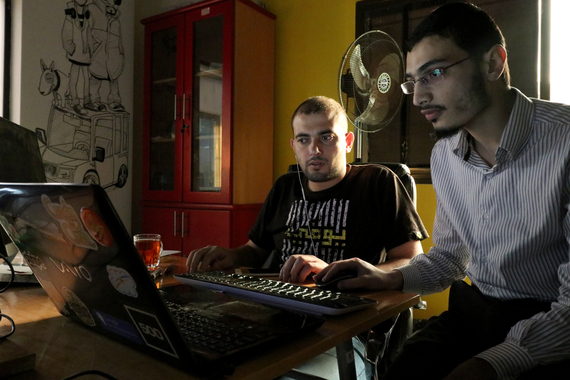Iliana Montauk served as the director of Gaza Sky Geeks (GSG) in 2014-2015. She currently helps lead their fundraising efforts. She graduated summa cum laude from Harvard University with a BA degree in History and Literature of France and the Middle East, and completed a Fulbright in Jordan focused on start-ups in the region. She has worked at Google, Monitor Group (now part of Deloitte Consulting), and Wamda (the TechCrunch of the Arab world).
Gaza Sky Geeks was founded in 2011 by Mercy Corps, a global humanitarian organization,with seed funding from Google's non-profit arm. A San Francisco Bay Area native and former Google employee herself, Montauk has experience that spans the tech sector and social-innovations fields.
Below is an excerpt from the book The Internet of Women: Accelerating Culture Change where Iliana contributed a chapter on her work with Gaza Sky Geeks:
Imagine a place 25 miles long by five miles wide with a beautiful coast and great Internet infrastructure. Add to it a highly educated, urban population, known for its leadership, work ethic, optimism, and willingness to take risks. These people have a deep love of technology and food, and a desire to be global leaders in innovation, business, and social impact. Sounds like Silicon Valley, doesn't it?
This is Gaza.
A Language Nerd Joins the Tech Sector
I arrived in Gaza in November 2013. Gaza Sky Geeks, an innovative program within the global organization Mercy Corps, had asked me to come manage the launch of its start-up accelerator--the first in Gaza.
If you had told me when I started studying Arabic in high school in 2000, that I would eventually be running a start-up accelerator in Gaza, I would have laughed with disbelief, for two reasons:
First, I was a language and literature nerd, not a person aiming to work in the tech sector. Back then, I thought that going into tech or start-ups was only for hardcore computer geeks such as my brother--the type that wore Costco jeans and shoes and kept their long hair in an unkempt ponytail. I was more likely to become a journalist, academic, or doctor--or so I thought.
Second, even though I was so eager to learn about the Arab world that I was taking Arabic classes before September 11 (when Arabic-language programs barely existed in the United States), I had a negative conception of Palestine. I assumed Palestinians were violent people who threw rocks. I planned to travel all over the Arab world except Palestine.
Both perceptions changed with time. I joined Google after college in 2006. By then, the tech sector seemed like a welcoming place that attracted top talent and solved world problems. In 2013, when Mercy Corps recruited me, I was working at the equivalent of TechCrunch in the Arab world, seeking a way to harness the tech sector, create a positive social impact, and make use of my languages. By then I had also met many Palestinians, and of course, there is no better way to let go of negative stereotypes than to meet the people they are about. I learned quickly that Palestinians are a hardworking, educated, and enterprising people--in fact, Palestinians are known throughout the Arab world for being leading businesspeople, the ones who built the oil sector in the Gulf. I called home my first week in Gaza and told my parents, "This place is more like Silicon Valley and Harvard than any other place I've been in my life."
Google Visits Gaza--and Sees Its Potential
Gaza Sky Geeks had been launched by Mercy Corps in 2011 with seed funding from Google.org, precisely because others from Silicon Valley had had a similar experience. Gisel Kordestani, Mary Grove, and other "Googlers" had been making their way around the world to conduct developer outreach. After several attempts in 2008 and 2009, they were able to enter Gaza (whose borders are almost entirely closed) thanks to Mercy Corps, which had access to Gaza through its humanitarian mandate.
They were blown away. Later, they would still say that Palestinians had struck them as some of the most entrepreneurial, enthusiastic, resilient and adaptable yet isolated people in the world. Thus, Google.org donated nearly $1M to launch what was then called the Arab Developer Network Initiative. Its agenda was to stimulate tech and entrepreneurship in Gaza. By late 2013, when I joined, some of the start-ups that had been through our competitions were receiving seed investment offers from regional funds.
An Isolated Start-up Community
It's December 2015. In two days, our start-ups will pitch at a competition in Jordan. This event is one of our top priorities for the year: run by a well-known Silicon Valley accelerator and one of our strongest partners, 500 Startups, it will draw both regional and international visibility. In addition, this is the first time this batch of start-ups will travel abroad.
Back in November 2013, my team arranged for Gazans to travel to Jordan so our start-ups could meet with their potential investors. We had never previously taken our start-ups out of Gaza. I was called into an emergency meeting with the Israeli Defense Forces because all of the "Gaza exit permits" we had applied for had been turned down. I learned then that Gazans are not allowed to leave Gaza via the border with Israel, since Gaza and Israel are at an official state of war, unless they meet one of a select list of exceptions: they work for a humanitarian organization, they are ill and have permission to receive treatment in Israel, and so on.
Since the border with Egypt is almost always closed and the border with Israel is open only to a select few, most of our start-up founders have never left Gaza before. This is their biggest challenge as founders: not power outages, not ongoing conflict, but rather, extreme isolation.
My team and I asked the Israeli Defense Forces (IDF) in 2013 to add Gaza Sky Geeks to their list of exceptions. After an internal review, they did, and our start-up Geeks started traveling to Jordan via Israel regularly, and from Jordan onwards to other parts of the Middle East, Europe, and so on. That border crossing became their lifeline.
At the 500 Startups competition, one of our start-up Geeks received the second-place prize. His radiant face appears all over Twitter with pictures of a $5,000 check, Dave McClure, and a regional representative for Microsoft, the sponsor of the event. The winner was the same start-up founder who was pulled aside for a 12-hour IDF security interview a week earlier. "A start-up pitch must be easy in comparison to that security interview!", I think, smiling as I see his overjoyed expression.
During that same trip, our start-up founders went to a movie theater. For most of them, it was the first time in their lives. Founders also expressed surprise at the fact that Jordan has 24/7 electricity--a basic piece of knowledge they should all have, since Jordan constitutes a target or test market for most of them. Even Gazans who follow start-up trends online are clearly affected by the physical isolation. When I sent my Gazan start-up accelerator manager to Europe for the first time, in 2015, he came back telling me "big data is a new trend that is all the rage now!". This was the top start-up leader in Gaza, a man who regularly reads TechCrunch and other publications, and he was hearing about big data several years after it had been a buzzword in the United States.
Gaza reminds me of my mother growing up in Poland, behind the Iron Curtain. She could not travel to the West because of her country's politics, not her own. When she received an orange or a banana, she would treasure it. When she would meet foreigners, she would soak in the experience, learning everything she could about what was happening elsewhere.
Similarly, when I brought the first copy of The Lean Start-up to Gaza, my team members tenderly held the books as if they were precious. And the best way to accelerate their companies, I've learned, is to keep them as closely connected as possible to the outside world. Although access to the Internet in Gaza is quite open (unlike some parts of the world, such as China), knowledge simply does not transfer online as fluidly as we assume. Even in tech, the human-to-human connection is key.
How to Give Birth to a Tech Sector in a Frontier Market
The strategy of Gaza Sky Geeks has pivoted several times since our launch in mid-2011. For the first two years, we ran ad hoc tech training and activities to inspire potential entrepreneurs in a part of the world where the concept of launching a start-up was not widespread or encouraged. In 2014, we added a co-working space and a start-up acceleration program that included brokering seed investments for our start-ups with a set of investment partners. In 2015, we expanded our investor network, ran our first ever incubation program (a prerequisite for entering our acceleration program), and began exploring a second line of business, thus creating immediate employment opportunities for tech talent in Gaza via distance working, outsourcing, or freelancing (our pilot was with Microsoft).
The key lesson during this evolution is that, while the quality of our local talent is high by regional standards, there is nevertheless a large gap between what students learn in college and what they will need to run a start-up successfully. Gaza's unemployment rate has skyrocketed since its borders closed. In 1999, it was 20%. In 2015, it was around 40% for the general population, and as high as 60% for the youth.3 This means that most potential start-up founders have never had any work experience. When I arrived in Gaza to launch our start-up accelerator in 2013, there were four start-up incubators already present, but as far as I could tell, nobody in Gaza had heard of lean start-up, minimum viable product, product management, or user acquisition.
Thus, we put our start-up teams through an intense period of knowledge transfer and experience before presenting them to our investment partners. During our "incubation," start-up teams went from idea stage to launching a minimum viable product (MVP).
This development in our strategy is exemplified by our cornerstone annual event. Start-up Weekend is a three-day competition during which teams give birth to a start-up idea, and ideally, launch it. In the first year, we expected the winning team to depart with a viable start-up and thus awarded them $20,000. That is the size of a seed investment in the region, with the equivalent purchasing power of approximately $500,000 in Silicon Valley. At present, we view Startup Weekend as our outreach event. It is an opportunity to draw talent into our pipeline and influence others in Gaza to be working on start-ups. We give the winning team approximately $500 because we recognize that teams at that stage need a large investment of knowledge capital before they can make good use of financial capital.
The challenge is that, in order to invest knowledge capital effectively, you need to have the right staff and strategy. The key word here is effectively. There are lots of humanitarian organizations and local universities offering training in places like Gaza. But to invest knowledge capital in a start-up team that has the potential to become a successful business, you need a staff that understands investments and the private sector. Only such staff can make effective decisions about whom to select for the knowledge-capital investment (i.e., the incubation program) and how to transfer that knowledge capital (i.e., what to teach and how). While we are still developing our own program, our traction so far has demonstrated that, with the right talent and strategy, the knowledge gap can be bridged sufficiently in a relatively short amount of time (six to 24 months).
When I arrived at Gaza Sky Geeks, my manager tasked me with developing a business model for this work. Eventually I concluded what one of my best mentors would later confirm: building a start-up pipeline in an emerging market is not a for-profit business. We have developed several revenue streams and aim to recoup 20% of our costs. For instance, our investment partners are for-profit entities that invest in start-up teams directly and then pay us for our services in accelerating those start-ups. Nevertheless, the cost of inspiring and preparing potential start-up founders in Gaza will outweigh the revenue we are able to generate. As for equity, it is a numbers game that also takes time: we would need hundreds of start-up investments annually and a decade in order to reliably make a profit. Finally, a key component in our model of impact is influence, which does not necessarily generate revenue. For example, one sign we are doing our work well is that other incubators in Gaza have adopted our curriculum.
Thus, planting the seeds of a tech sector in a new environment requires patient (philanthropic) capital. This is the education business, and just like Silicon Valley started with government grants decades before it created exponential job growth, entities such as Gaza Sky Geeks will need to exist for a decade or more before Gaza becomes the Silicon Strip. If we do not begin now, we will lose a whole generation of talent in environments such as Gaza. This will be a loss not only for their communities, but for ours as well--Silicon Valley needs their talent just as much as the Middle East does.
Though our business model depends on philanthropic funding, it is still important to select our donors carefully--and here, the global tech, entrepreneurship, and private sectors are important partners. Our current funders include Google for Entrepreneurs, Microsoft, Techstars Foundation, Skoll Foundation, PalTel Group, Bank of Palestine, and Bayt.com.
These private sector sources provide "smart money": they measure our success according to metrics that meaningfully guide our work, share curated and targeted networks of fantastic potential partners, and advise us by sharing insider tips or observations they have gathered through their deep experience. Their engagement expedites the success of tech entrepreneurship in frontier markets. In addition to those private-sector partners, our model relies heavily on partnerships with for-profit investors. We broker investments between them and our start-ups. Any investor can choose to make an offer to any start-up. I have learned that the potential for financial investment has to be there in order not only to motivate entrepreneurship, but also to ensure that our activities are rigorous and that they produce commercially viable start-ups. We shaped our incubation program at Gaza Sky Geeks after our first year of running an accelerator, because we then understood what our investors would be seeking. Without that experience, it is too easy for a "start-up incubator" in an emerging market to be launching glorified university-graduation projects.
How We Nurtured Women Start-up Founders
Mariam Abulteiwi was a fourth-year computer-engineering student at a top university in Gaza, and she had never heard of start-ups. She attended our Startup Weekend in 2011 because she had heard Google was going to be there. When she returned to our next competition in 2012, she came prepared to pitch an idea. It was essentially an Uber before Uber was well-known. She kept working on the idea until she became the first female CEO in Gaza to close an investment for a start-up.
Mariam had never planned to become the CEO of a business. Neither had Abeer al-Shaer. Abeer was studying computer engineering and English literature in 2015. Because she was ambitious, she was completing two sep- arate bachelor's degrees simultaneously, and planned to become a university lecturer or a teacher--the professions in which she had seen women. After completing the Gaza Sky Geeks incubation program, she said, "I now realize I was meant to be a CEO, or at least a manager. I love building things. If my start-up does not succeed, I'll get an MBA. By launching a company, I feel like I'm shaping society, not just observing it."
When I arrived at Gaza Sky Geeks, approximately 25% of our participants--predominantly in our outreach activities--were women. This is high for the tech sector globally, but Google for Entrepreneurs challenged us to increase that even further.
Through focus groups, we learned that women had no stigma with regards to science, technology, engineering, or math (STEM) fields. Many women told me, "In the United States you think men are better in math and science? That's ridiculous. Most of the top students in those fields were girls when I was graduating from high school." We realized we had an advantage over some parts of the world and wanted to harness this opportunity to create one of the most inclusive tech sectors. We also felt a responsibility to do so since our tech sector was just being born, a blank slate. If we could successfully build it inclusively from the very beginning, we would not have the harder work of undoing bias later on.
Women were facing some barriers, however. They said they did not have the knowledge they needed to launch a start-up, which we interpreted as a lack of confidence since we saw that men with the exact same level of knowledge did not hesitate. This we have been addressing through regularly scheduled activities specifically targeting women. For example, when we ran an introduction to an Internet of Things (IoT) event for the general community, only a couple women attended amongst dozens of men. But when we ran an IoT event just for women, 40 attended eagerly and asked very intelligent questions. In addition to growing their knowledge, these events build a strong, supportive community of women who boost each other's confidence later in co-ed settings.
Women also said their families would not support their endeavors if they drained the family's meager income. In Gaza, $400 may be a family's total budget for the month, and an individual coming daily to our co-working hub can easily spend $50 a month on transit. Men are more often able to receive this funding, either because they make the financial decisions in their families or because families are more eager to fund their career endeavors even if the payoff is not immediately clear. We began giving women small stipends ($50 to $100 a month) to participate in our activities and found that their family's buy-in immediately increased. Women told me personally that this is what enabled them to participate or prevented them from dropping out.We were also conscious of women's needs in many other ways: scheduling events at times they could more easily attend (most women in Gaza are expected to be home by dark), prominently featuring women in our outreach materials, and weighting our acceptance to ensure 50% participation by women in our main early-pipeline activity (Startup Weekend). As a result of these measures, our overall women's engagement rate is now around 40%, which I believe is an impressive statistic globally. (We still have challenges securing investments for women-led teams--cracking that one is one of our top goals.)



